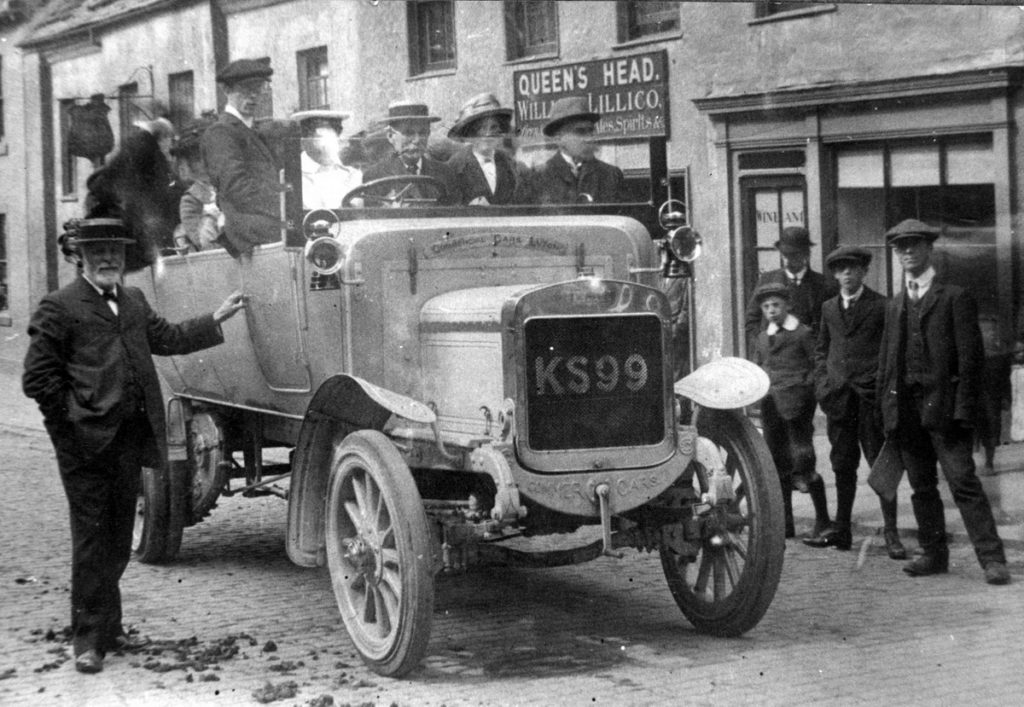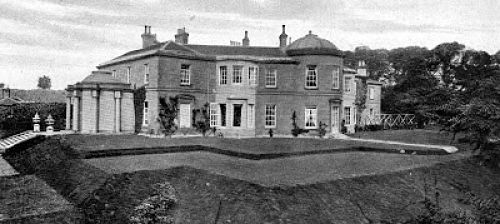
TWEEDMOUTH JOTTINGS
On Monday afternoon, while driving down the Main Road at High Gate, a horse belonging to Robert Norris, Tweedmouth, took fright to such an engine blowing its whistle, and bolted down Main Street. A man named James Douglas, who was on the cart, fell off, and was cut and bruised about the head, and, continuing its career, the horse came in contact with a stationary motor car. Norris, who had kept his head, managed to draw the frightened animal up. The mud-guard of the car was torn off. Douglas, who was stunned by his fall, was taken to Berwick Infirmary for treatment. He is doing as well as can be expected.
TRACTION ENGINE GOES ON ROUND A CORNER ON ONE WHEEL
THE DRIVER’S PLUCK
On the morning of Thursday last a serious accident was averted by the presence of mind of an engine driver named Jack Morrison. He was bringing a traction engine and mill from Tweedmouth Station to Messrs Bain’s down the South Side of the High Gate when a gear pin on the engine became detached, and the engine commenced to free wheel at great speed down the hill. Knowing the danger of running down Main Street, where there are always children playing about, Morrison made up his mind to take the hairpin turn into Shielfield, the hill there being calculated to stop the engine’s career.

The traction engine took the turn at great speed, going round practically on one wheel, and then Morrison came face to face with another problem, several motor cars being on the road further up. At great danger to himself, he took the only course open to him, and swung the engine dead into the wall at Turret Villa. The engine knocked a clean hole in the wall and came to a stop. Morrison being little worse of his adventure. The foreman jumped off the engine before they reached the railway bridge.
SNIPPET FROM LETTER
Some time ago you had a report in your paper in reference to the “Bridge Toll House,” and the place stated was at the end of the bridge. Now, this was not the case, for it was in one of the recesses at the top of the bank on the bridge — the one next to the Sundial. I can remember seeing this, seeing I had to pass it so often when a young man. I was told by father, and also my grandfather, the gates were just on the Bridge End. My grandfather, being one of the Coastguards, helped to pull them down.

There is another report in reference to Holy Island Castle, and I can endorse part of the history given by you about the Coastguards living in the Castle: for my mother’s father was banished from Spittal to the Castle because of my father’s grave misdeed in marrying his daughter. This was the punishment meted out to him, and I can remember paying a visit there when a boy. I mention this to show the difference then and now. Even after 50 years’ absence except for annual visits, I have still a kindly feeling for the old town. — I remain, yours sincerely. James Scott, 30, Chatterton Street, Southwick, Sunderland.
LOCAL NEWS
On Sunday a most successful motor char-a-banc tour of the Borders was held by the clerical and locomotive staff of Berwick Station. Leaving Berwick about nine o’clock in the morning, the journey was made through the beautiful pastoral scenery of the Merse, by way of Duns, Greenlaw, and Earlston, on to Melrose, where an alfresco lunch was very much enjoyed.

The company then proceeded on to Selkirk, where a most enjoyable tea was served in the Fleece Hotel. A few hours were spent in song and sentiment, and Selkirk being left behind. Kelso was reached by way of St Boswells, and a little time was spent looking round the pretty little town. While here the trippers saw the competitors in the reliability run of Berwick Motor Club pass through. Berwick was reached about 9.30, the entire company being highly satisfied with the tour, upon which the sun had smiled all day




